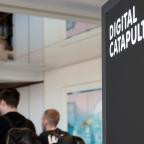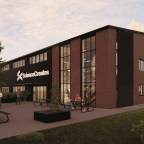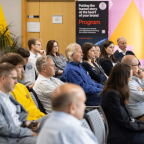
Katy Ho, Digital Catapult: Bristol is the blueprint for a successful tech ecosystem. Here’s why.
Katy Ho is the Head of Innovation at Digital Catapult
Bristol's tech industry has been thriving in recent years. This can be attributed to unique characteristics of the region’s tech ecosystem, which has incentivised countless startups and established tech companies to select the city as their headquarters. Bristol is renowned for its expertise in cutting-edge technologies such as quantum computing, robotics, and artificial intelligence, and a supportive ecosystem of accelerators and incubators continue to provide resources and support to entrepreneurs and tech startups in the city, to ensure their success.
Along with a skilled pool of tech professionals and excellent transport links, Bristol's high quality of life has contributed to the growth of its tech industry, cementing the city's reputation as a leading hub for technology and innovation in the UK. At Digital Catapult, I lead the innovation team who has designed, developed and delivered several innovation programmes in the city, to bolster the success of the local tech ecosystem and to understand how Bristol’s success could be replicated in innovation programmes elsewhere. With such success, it begs the question, what can the rest of the country learn from the success of Bristol’s tech landscape?
The city’s environmental focus
Bristol's tech ecosystem is at the forefront of environmental initiatives and sustainability, with many of its startups and established firms incorporating green technology and practices in their products and services. The city's strong research and innovation culture in technology has played a key role in advancing environmental sustainability, with the University of Bristol and other research institutions in the city leading the way in developing new technologies to address environmental challenges.
The focus of Bristol's tech ecosystem on sustainability has been a key factor in its success, attracting investors and talent who share a commitment to environmental stewardship. As consumers and companies become increasingly aware of the need to reduce their environmental impact, Bristol's tech companies are well-positioned to meet this demand, providing sustainable solutions and driving innovation in green technology.
This emphasis on sustainability has also helped to create a culture of responsibility and accountability, inspiring companies to operate in an environmentally-conscious manner. Bristol's success demonstrates the potential for the tech industry to drive positive social and environmental change, and serves as an example to the rest of the country on the importance of balancing economic growth with a commitment to sustainability to foster a successful tech ecosystem.
Fostering a collaborative and inclusive community
Bristol's tech ecosystem has also developed an inclusive and collaborative community, which has contributed to the city's thriving tech industry. Research found that Bristol is the fourth-largest tech cluster in the UK, with over 30,000 people employed in the sector, generating £1.8 billion in turnover. This growth is due in part to the city's vibrant and supportive network of co-working spaces, accelerators, and incubators, which provide resources and mentorship to tech entrepreneurs and startups, like the work of Digital Catapult.
At Digital Catapult, we’re supporting businesses across the South West region by working with innovators, small-medium enterprises, large businesses and academia to drive early adoption of advanced digital technologies. In doing so, we are building on the strengths of the existing ecosystem and its longstanding reputation for innovation.
The city's approach to fostering innovation and entrepreneurship is grounded in the belief that by sharing knowledge and resources, and creating a sense of community, businesses can create products and services that benefit both society and the economy.
Encouraging innovation and experimentation
Bristol's tech ecosystem has become known for its supportive environment that encourages innovation and experimentation while being more open to risk. Last year, Bristol's 208 tech startups and scaleups reported a combined turnover of £4.69b last year, making up 36% of the city's high-growth businesses.
Bristol's willingness to take risks has resulted in the development of cutting-edge technologies and attracted significant tech investment in the region, like the MyWorld programme. This programme is led by the University of Bristol and funded by UKRI, and involves 13 partners. It’s a major pillar of Digital Catapult’s work in the West of England, and it will see the development of new R&D facilities to pioneer new digital tools, content, and technologies.
The tech ecosystem's openness to risk has also provided space for experimentation, which has led to a thriving community of entrepreneurs and startups who are constantly pushing the boundaries of what is possible. For example, Bristol-based Condense Reality, which opened the first ever metaverse live-streaming studio, will allow their clients in the music industry to stream live performances into any virtual space. Celestial Labs, based just outside of Bristol in Bath, is another example of a tech company pushing the boundaries of what’s possible by delivering spellbinding drone shows across the globe. By taking risks and experimenting with new technologies, Bristol-based tech companies are driving innovation and creating solutions to complex challenges in a variety of industries, which is something that more cities should be doing if they want to replicate Bristol’s success.
With many looking to UK tech as the key driver of economic growth amid recession, more cities across the country should look to the steps that Bristol has taken to ensure its tech ecosystem remains one of the most pioneering and competitive. Whether it’s embracing environmental initiatives, fostering collaboration and inclusivity or encouraging innovation and experimentation, it’s time the Bristol blueprint is rolled out and adopted elsewhere.







